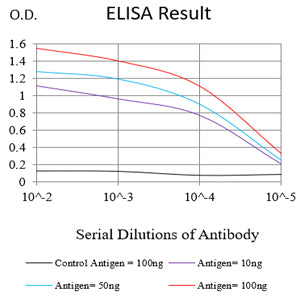
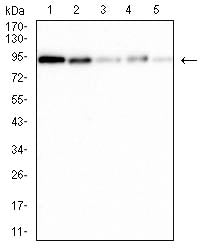
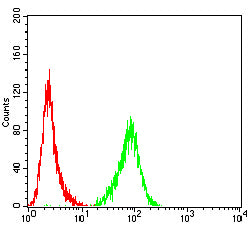
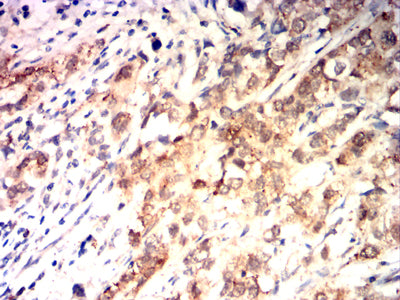
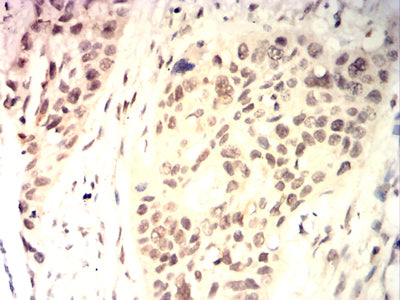
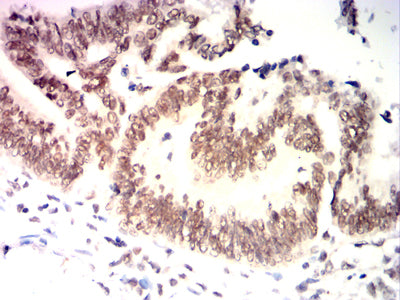
| WB | 1/500 - 1/2000 | Human, Monkey |
| IF | 咨询技术 | Human, Monkey |
| IHC | 1/200 - 1/1000 | Human, Monkey |
| ICC | 技术咨询 | Human, Monkey |
| FCM | 1/200 - 1/400 | Human, Monkey |
| Elisa | 1/10000 | Human, Monkey |
| Aliases | RCC; SCAR26 |
| Entrez GeneID | 7515 |
| clone | 7B4C12 |
| WB Predicted band size | 69.5kDa |
| Host/Isotype | Mouse IgG1 |
| Antibody Type | Primary antibody |
| Storage | Store at 4°C short term. Aliquot and store at -20°C long term. Avoid freeze/thaw cycles. |
| Species Reactivity | Human, Monkey |
| Immunogen | Purified recombinant fragment of human XRCC1 (AA:1-150) expressed in E. Coli. |
| Formulation | Purified antibody in PBS with 0.05% sodium azide |
+ +
以下是关于XRCC1抗体的3篇参考文献示例(内容为模拟概括,非真实文献):
---
1. **文献名称**: *XRCC1 Protein Expression in Breast Cancer: A Marker of DNA Repair and Clinical Outcome*
**作者**: T. Caldecott et al.
**摘要**: 研究通过Western blot和免疫组化分析乳腺癌组织中XRCC1蛋白表达,发现低表达患者对化疗敏感性更高,提示XRCC1抗体可作为预测治疗反应的生物标志物。
2. **文献名称**: *Validation of XRCC1 Antibody Specificity in Colorectal Cancer Tissues*
**作者**: A. Mohammad et al.
**摘要**: 利用siRNA敲低XRCC1基因后,Western blot显示抗体信号显著减弱,验证了其特异性;进一步免疫组化表明XRCC1高表达与结直肠癌患者生存期延长相关。
3. **文献名称**: *XRCC1 Polymorphisms and Protein Expression in Non-Small Cell Lung Cancer*
**作者**: J. Fan et al.
**摘要**: 通过ELISA和免疫荧光检测携带不同XRCC1基因型的肺癌细胞系,发现特定突变导致蛋白表达下降,提示XRCC1抗体在个性化医疗中的潜在应用。
---
注:以上为模拟文献,实际研究中建议通过PubMed或Web of Science以“XRCC1 antibody”为关键词检索最新文献。
The XRCC1 (X-ray repair cross-complementing protein 1) antibody is a critical tool for studying DNA repair mechanisms, particularly base excision repair (BER) and single-strand break repair (SSBR). XRCC1 is a scaffolding protein that lacks enzymatic activity but coordinates key repair proteins, including PARP1. DNA ligase IIIα, and DNA polymerase β, to maintain genomic stability. It interacts with damaged DNA through its N-terminal domain and facilitates repair via phosphorylation-dependent protein interactions. Dysregulation of XRCC1 is linked to increased cancer susceptibility, neurodegenerative disorders, and chemotherapeutic resistance.
XRCC1 antibodies are widely used in research to detect protein expression, localization, and post-translational modifications (e.g., phosphorylation at Ser518/519/523) in tissues or cell lines. They help evaluate DNA damage responses under conditions like radiation, oxidative stress, or chemotherapy. Common applications include Western blotting, immunohistochemistry (IHC), immunofluorescence (IF), and co-immunoprecipitation (Co-IP). Commercially available antibodies are typically raised in rabbits or mice against specific epitopes of human XRCC1. with validations performed using knockout controls or siRNA-mediated depletion.
Researchers also utilize XRCC1 antibodies to explore its role as a potential biomarker for cancer prognosis or therapeutic targeting, particularly in combination with PARP inhibitors. Variants in the XRCC1 gene may influence antibody detection efficiency, necessitating careful experimental design.
×